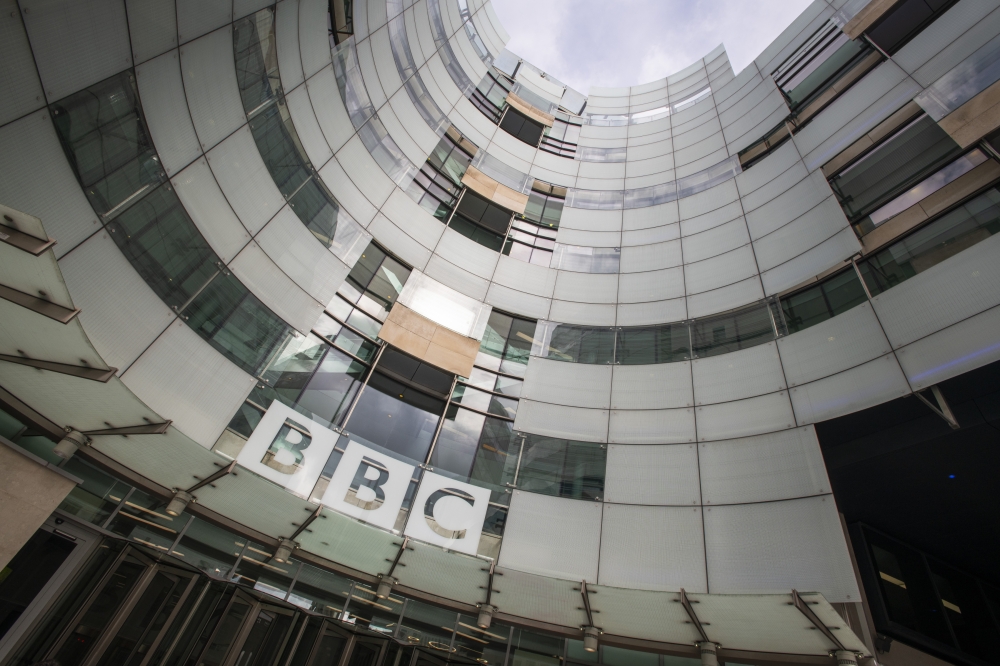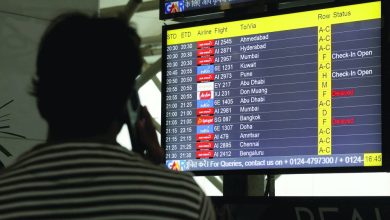How the fallout from the Trump documentary paralyzed the BBC

LONDON — The response was ready to go.
After furious headlines in a British newspaper accused the BBC of institutional bias over a misleading edit of a speech by President Donald Trump, top executives at the British public broadcaster knew they had to act quickly.
On Tuesday, Nov. 4, a day after the first article had appeared online, they were prepared to go public with a statement approved by the BBC’s top communications team and the director-general, Tim Davie. It would acknowledge that Panorama, the flagship investigative program, had made a mistake by splicing together footage from Trump’s speech on Jan. 6, 2021, shortly before an attack on the Capitol.
To their frustration, the executives, including the head of news, Deborah Turness, found themselves blocked by the BBC board, according to four BBC executives and another senior employee with knowledge of the events. News executives and board members were divided over whether to focus on the editing error or to concede wider failings in the newsroom.
Instead of addressing the criticism, the BBC was silent for seven days. In the vacuum, a wave of headlines became a flood of unchallenged claims that eventually pulled in the White House, with press secretary Karoline Leavitt declaring the BBC “total, 100% fake news.” By the time the broadcaster issued a statement, the scandal had engulfed the organization and prompted the resignations of Davie and Turness.
The story of how the BBC careened into one of the worst crises in its 103-year history may have centered on the editing of Trump’s remarks. But it was about something much bigger: a long-standing debate, often driven by the right, over whether the BBC is institutionally biased.
The seven days of silence inflamed the controversy. Long a proxy for cultural battles in Britain, the BBC has faced increasingly intense political attacks, exposing the institution to potential funding cuts and legal liability. Trump has threatened to sue the BBC for $1 billion or more.
This account is based on public documents and interviews by The New York Times with nine current BBC executives and senior employees with knowledge of events, including a critical emergency board meeting on Nov. 6. The employees spoke on the condition of anonymity because they did not have permission to speak publicly. The BBC declined to comment.
A Paralyzing Board Battle
The headline Nov. 3 at the right-wing Daily Telegraph was blunt: “BBC doctored Trump speech.”
It cited a letter from a former adviser to the BBC’s standards committee, Michael Prescott, describing what he called “worrying systemic issues with the BBC’s coverage,” including Panorama’s spliced footage.
The next day, a parliamentary committee wrote to the chair of the BBC board, Samir Shah, demanding answers.
As the days ticked by without a response, lawmakers weighed in, calls for action multiplied, and the crisis dominated the news.
On Thursday, Nov. 6, at 5 p.m., 11 board members assembled for an emergency meeting. Several were furious at the delays and argued over how best to respond to the snowballing crisis, according to two BBC executives and a senior employee with knowledge of the meeting.
In the meeting, Turness pushed for the board to fight the accusations of institutional bias and wanted the statement to say that there was no intent to mislead with the edit, the three employees said.
One of the most powerful voices on the board, Robbie Gibb, disagreed, according to the three employees. He wanted the response to be broader and more repentant. The board’s four other political appointees, all installed by Conservative governments, also opposed Turness’ proposed language.
Gibb did not respond to a request for comment.
With a background in the news media and Conservative politics, Gibb had long accused the BBC of left-leaning bias. He was appointed to its board in 2021 by the Conservative Boris Johnson, a longtime BBC critic who was then prime minister. Gibb had lobbied to get Prescott, the memo’s author, the advisory role, according to two senior news executives.
Allies of Turness at the meeting were fewer and less coordinated, the three employees said. One board member missed the meeting because he was in Antarctica. Others had little experience in news and were not as vocal. Of these members, appointed by a subsection of the board, one had a journalistic background, and the rest had worked in fields such as finance, management and energy.
The debate ended in paralysis. The board had blocked BBC News from releasing a statement about BBC News.
That weekend, Turness and Davie resigned. Davie, battle-worn from previous BBC scandals, had an eye on his exit and referred only indirectly to the Trump controversy in his resignation letter. “While not being the only reason,” he wrote, “the current debate around BBC News has understandably contributed to my decision.”
Turness was more pointed. “I have taken the difficult decision that it will no longer be my role to lead you in the collective vision that we all have: to pursue the truth with no agenda,” she wrote.
“While mistakes have been made,” she added, “I want to be absolutely clear recent allegations that BBC News is institutionally biased are wrong.”
On Monday, Nov. 10, a full week after the first Telegraph article and a day after the two resignations, the BBC issued a response.
In a letter to the parliamentary committee, Shah apologized for the BBC’s “error of judgment” in the editing of the video. While not directly addressing claims of institutional bias, he said the BBC had “produced thousands of hours of outstanding journalism” and that it was “important that a sense of perspective is maintained.”
The Edit
Editing for brevity is standard practice in television news, but it is a basic principle to ensure such cuts do not mislead.
Trump spoke for 70 minutes. The final edit, led by veteran BBC producer Matthew Hill, combined early parts of the speech with a section 54 minutes later, condensing them into a 12-second clip. “We’re gonna walk down to the Capitol” and “I’ll be there with you” were spliced with “And we fight. We fight like hell.”
It suggested a direct link between Trump’s words and the attack on the Capitol. The edit was not picked up as a problem by others on the team, overseen by seasoned program editor Karen Wightman.
The BBC and Wightman declined to comment. Hill did not respond to a request for comment. “There was no intention to mislead,” BBC News said in a statement Nov. 10. “The intention of this sequence was to convey the key messages of the speech in a condensed format.”
It was not the first time Panorama faced criticism over spliced footage. On the opposite side of the political spectrum, the BBC quietly acknowledged in 2022 that a Panorama film investigating antisemitism inside the Labour Party, broadcast three years earlier, had misleadingly edited an interview.
In the interview, a young Jewish woman described how she had been subjected to “antisemitic abuse,” adding that “a lot of it came from the far right — neo-Nazi abuse, telling me Hitler was right, telling me Hitler did not go far enough.”
“At the same time,” she later said, “I was receiving very similar and almost often the exact same tropes and antisemitic abuse from the far left.”
In the edit, she was shown saying, “I joined the Labour Party in 2015. The antisemitic abuse I received was what I was subjected to every single day. Telling me Hitler was right, telling me Hitler did not go far enough.”
The filmmakers later said that “her comments about the source of antisemitic abuse from left and right became mixed up in the editing, and we should have made that distinction clearer.”
The film about Jan. 6 — “Trump: A Second Chance?” — attracted little attention when it aired in October 2024.
Later that year, Gibb commissioned a review into the broadcaster’s coverage of the 2024 U.S. election, according to the two senior news executives. He tapped a BBC journalist, David Grossman, a researcher for the standards committee, those executives said. When Grossman delivered his report in January 2025, he flagged the misleading Trump edit.
Prescott expressed his concerns in a subsequent standards committee meeting with BBC News executives, according to Shah’s letter to Parliament. The executives told him that the issue had been raised with the Panorama team, who had defended their journalism, according to the two senior news executives. No formal action was taken.
Prescott’s contract was not extended beyond June 2025, according to two BBC employees with knowledge of the matter, and he sent his memo, unprompted, to the board months after he left. It was this document that was later leaked to the Telegraph.
The memo said the Trump documentary was “neither balanced nor impartial.” It also charged that the BBC showed systematic bias in its coverage of the U.S. election, issues around racial diversity, the Israel-Hamas war and transgender rights.
Prescott declined to comment for this article, but in the memo, he wrote that his views on the BBC “do not come with any political agenda.”
Shah would later criticize the memo in his letter to the parliamentary committee, saying it did not give “a full picture” of the situation. The BBC, he said, had already addressed many of the issues raised by Prescott, including restructuring BBC Arabic to tighten editorial oversight and, in other cases, issuing corrections or taking disciplinary action.
But he acknowledged that on the Panorama complaint, “it would have been better to take more formal action.”
Even BBC supporters argue management should have acted sooner. “This was a bad error,” said Alan Rusbridger, the former editor of The Guardian and now the editor of Prospect magazine. “In a normal organization, the program editor would perhaps be disciplined or removed.”
He argued, though, that the final outcome — the resignation of Davie and Turness — was disproportionate. “The BBC has ferocious enemies that puts it under the microscope and amplifies anything it does,” he added.
‘Culturally Captured’
Eight months before joining the board, Gibb penned a column in the Telegraph in which he made no secret his views about the broadcaster.
“The BBC has been culturally captured by the woke-dominated group think of some of its own staff,” he wrote. “There is a default Left-leaning attitude from a metropolitan workforce mostly drawn from a similar social and economic background.”
But he has also defended the BBC. In a 2020 interview, he cited the “value for money” provided by its vast operations in entertainment and news and argued in favor of the license fee paid by British households.
His career trajectory reflects a particular quirk of British media, where key figures in politics and journalism sometimes float between the two worlds.
Gibb has described himself as a “proper Thatcherite Conservative” — referring to Margaret Thatcher, the prime minister who dominated British politics through the 1980s. He spent years at the BBC and was a senior political editor there before becoming director of communications for a Conservative prime minister, Theresa May, in 2017. He worked as an adviser to GB News, which aims to be Britain’s version of Fox News. He also led the consortium that bought the Jewish Chronicle newspaper in 2020.
The day his appointment to the BBC board was announced in April 2021, Gibb told the Telegraph that he had “always believed that impartiality should be the BBC’s No. 1 priority” and “the corporation has a big job to reform.”
In one of his earliest roles, Gibb joined a small group reviewing the BBC’s conduct in an earlier scandal over an interview with Princess Diana. The review led to the appointment of two independent advisers, including Prescott, who wrote the memo.
The current crisis has drawn attention to Gibb and his impact at the BBC.
When employees were invited to submit questions anonymously during an all-hands meeting this week, several expressed concern that someone with such openly partisan views could present himself as an impartiality czar.
“Until Robbie Gibb and any other political appointee are removed, we cannot possibly be truly trusted to be an unbiased organization,” one employee wrote, according to messages reviewed by the Times.
Ed Davey, the leader of the centrist Liberal Democrats, the third-largest political party in Parliament, this month in an op-ed called for the government to remove Gibb from the board, saying political appointments undermined the BBC.
Neither Davie and Turness is known for left-wing leanings. Davie is a former local Conservative Party official. Turness worked to get Nigel Farage, the right-wing populist leader of Reform UK, a prime-time slot on BBC Question Time during the 2024 election in Britain. One of her first hires was of John McAndrew, a former news director at GB News who had worked with her at NBC News International.
Two days after his resignation, Davie, who had begun his BBC career two decades ago in the marketing department, addressed the all-hands meeting.
Wearing a dark suit and, as usual, no tie, Davie attempted to soothe and rally the organization’s embattled staff. He said he was “fiercely proud” of the organization, according to the BBC, and recalled previous “tumultuous times” it had weathered. “You can ask questions of: ‘Where is the BBC going? Are we rudderless? What happens to the future?’” he said.
“I think what I would say is these times are difficult for the BBC,” he added. “We will get through it.”
This article originally appeared in The New York Times.



